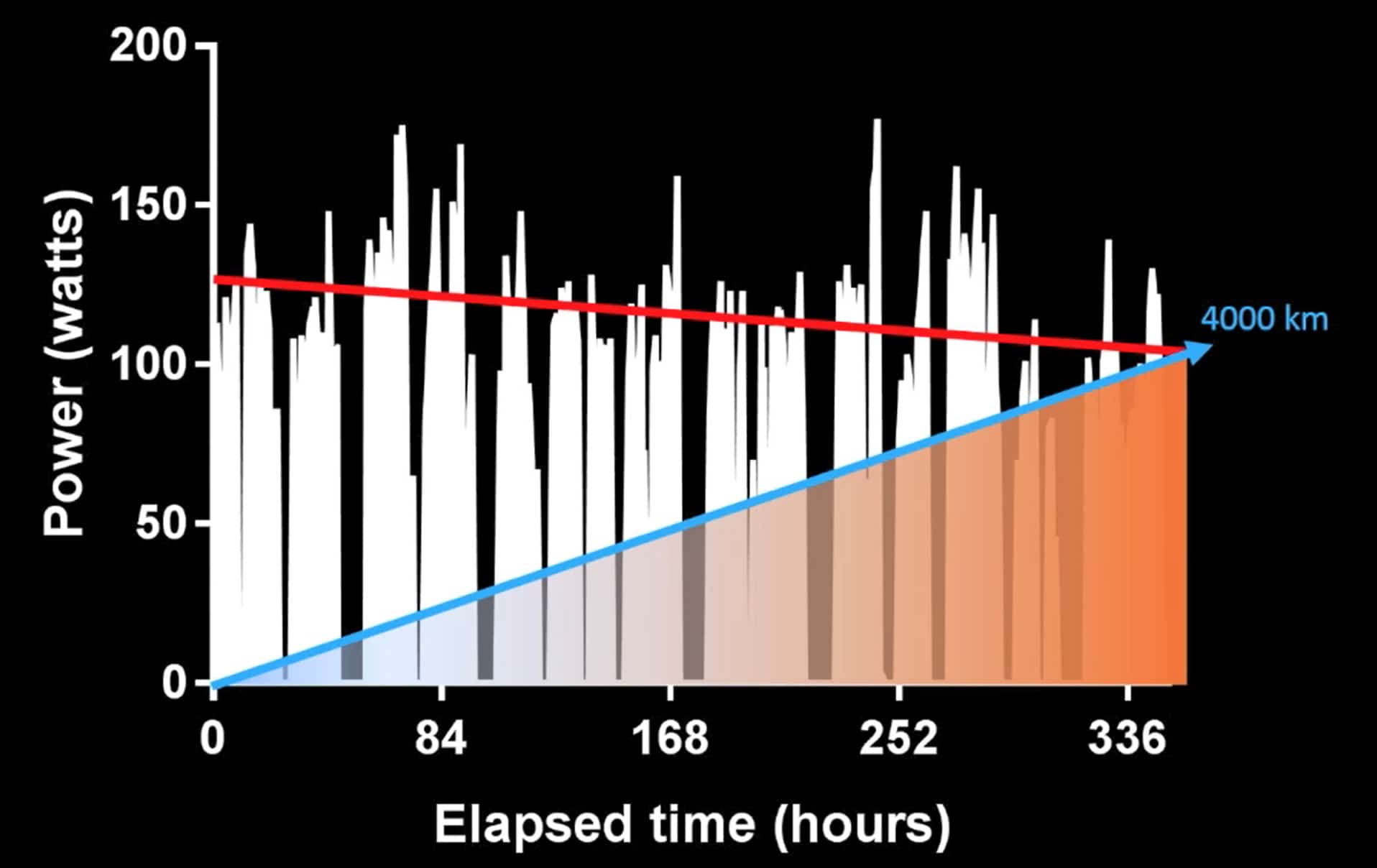By Daniel Brayson, King’s College London, @DrDanBrayson
Cycling 4000 kilometres as quickly as possible inevitably means that fatigue plays an important role, and those who manage and deal with it well are likely do best in endurance bike racing. Fatigue is the over-arching term to describe the inability of an individual subject to maintain a performance output over time; in the case of the Transcontinental Race, a very long time.
The reduction of the body’s energy stores is a key factor in the development of fatigue. Elite bike racing teams focus heavily on it to avoid what is affectionately known in cycling circles as ‘bonking’: feeling hypoglycaemic, with your legs turned to jelly, and mild dizziness. However, whilst fuelling is undoubtedly crucial, the Transcontinental Race provides the added challenge of being one long stage from start to finish: no daily finish lines, no support team and massage waiting at the end of every day. Therefore, developing a race strategy also includes deciding when and how much to rest and sleep, and route planning – both of which will impact on fatigue. Managing these components to optimise performance in the race is no mean feat especially when there are other factors to consider which are completely out of your control…

Response inhibition – the power of the mind
Due to the fiercely hot weather, a number of racers made the decision to cycle during the night and sleep during the day to avoid the hottest part of the day. This strategy didn’t work for me: I find it very difficult to inhibit my physiological urge to sleep at times that I would normally do so; this was no surprise, as I would famously fall asleep in nightclubs during my undergraduate years! Those who can resist these kinds of urges have what is known as a strong ‘response inhibition’: they are able to use the fortitude of their minds to ignore the desire of their bodies to sleep, and power through. They are likely to be successful endurance cyclists too, since they may also have a strong response inhibition to fatigue! The reason for this has been discovered recently: to a certain degree, fatigue is determined by the effort perceived by an individual rather than just the energy reserves available in their muscles (Marcora & Staiano, 2010). In fact, studies have shown that when a subject stops exercising because of exhaustion, there is still energy left in their muscles suggesting that it is the brain that is the limiting factor to performance!
[youtube https://www.youtube.com/watch?v=bP_aq1cp8Qk&w=560&h=315]
Stress and physical performance
Remaining on the topic of the psychological components of fatigue, it is also now known that dealing with stressful situations can increase the effort perceived by an athlete and have a negative impact on endurance performance (Marcora et al., 2009). During the Transcontinental Race I encountered numerous stressful situations. For instance, I lost lots of my gear by just forgetting to re-pack it and leaving it in random places. I lost a pulse oximeter – a device to measure the oxygen saturation of my blood – before I got anywhere near a mountain, missing out on some nice data. My phone, on which I was heavily reliant for navigating and for performing an app-based psychological test called the Stroop test, broke because of the heat. I bought a new one and exchanged my sim card, only to realise 15 minutes down the road that I didn’t have it. I raced back to the shop – it wasn’t there. Retracing my steps, I could no longer determine if I was sweating through physical effort or panic! I finally found my brand new phone, just peeking out amongst the packaging in which it originally came: I had thrown it in the bin!!! Fatigue begets fatigue begets fatigue…
Make sure you follow the blog and subscribe to our Youtube Channel to keep up with the Ultra Cycle Diaries. Check back every Wednesday for a new blog and video!
Read Next Instalments
The Ultra Cycle Diaries – Nutrition
https://www.physoc.org/blog/the-ultra-cycle-diaries-nutrition/
The Ultra Cycle Diaries – The Finish Line
https://www.physoc.org/blog/the-ultra-cycle-diaries-the-finish-line/
Read Previous Instalments
The Ultra Cycle Diaries – Setting off on the Transcontinental Race
https://www.physoc.org/blog/the-ultra-cycle-diaries-setting-off-on-the-transcontinental-race/
The Ultra Cycle Diaries – Man vs Heat
https://www.physoc.org/blog/the-ultra-cycle-diaries-man-vs-heat/
References
Marcora SM & Staiano W. (2010). The limit to exercise tolerance in humans: mind over muscle? Eur J Appl Physiol 109, 763-770.
Marcora SM, Staiano W & Manning V. (2009). Mental fatigue impairs physical performance in humans. J Appl Physiol (1985) 106, 857-864.
